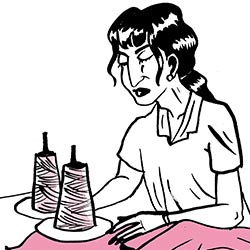Part of the Series
Ladydrawers
Support justice-driven, accurate and transparent news — make a quick donation to Truthout today!
“Our Fashion Year,” our year-long investigation into gender, labor, and cultural production, has followed the threads of the international garment trade from your local fast fashion emporium all the way back to their source, and then some. There, in the factories in developing nations, women who have trouble with the long hours, low pay, unsafe conditions or harassment have few other options besides sex work. But, as we’ve seen, anti-sex trafficking NGOs often seek to place them right back in the precarious garment industry they often sought to escape in the first place. The question Leela Corman and Anne Elizabeth Moore ask this month is, what else do these organizations do?
It’s only the latest in our year-long investigation into gender, labor and cultural production. (You can read our previous three years of strips here.) We’ve so far followed the threads of the international garment trade in the factories of developing countries, in “Fast Fashion,” “Let’s Go Shopping” and “The Business of Thrift” (with Julia Gfrörer); and “Zoned,” “Red Tape” and “Outta Sight (Out of Mind)” (with Melissa Mendes). Ellen Lindner’s It’s the Money, Honey and Out of the Factories Part 1 and Out of the Factories Part 2 (also with Melissa Gira Grant) brought us from the garment trade into the sex trade abroad. Next month, we’ll look at The Somaly Problem – or, how tiny fibs can have a big impact, and who benefits from it. (As always, our previous strips can be found here.)
Speaking against the authoritarian crackdown
In the midst of a nationwide attack on civil liberties, Truthout urgently needs your help.
Journalism is a critical tool in the fight against Trump and his extremist agenda. The right wing knows this — that’s why they’ve taken over many legacy media publications.
But we won’t let truth be replaced by propaganda. As the Trump administration works to silence dissent, please support nonprofit independent journalism. Truthout is almost entirely funded by individual giving, so a one-time or monthly donation goes a long way. Click below to sustain our work.

